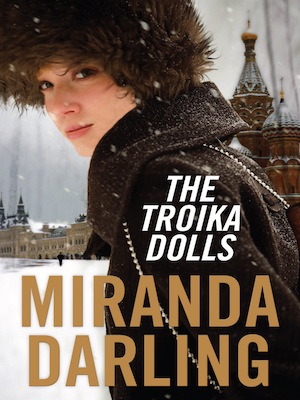The Troika Dolls

THE
TROIKA
DOLLS
Miranda Darling began her career as a fashion model in Paris and London, then went on to read English and Modern Languages at Oxford University. She travelled widely to countries such as Russia, Azerbaijan, Croatia, Namibia and Indonesia before returning to Australia to complete a Masters in Strategic Studies and Defence. She analysed new security threats for a think tank, where she published widely in newspapers and journals. She retains an interest in international intrigue and now writes full time.
THE
TROIKA
DOLLS
MIRANDA DARLING

The poem ‘In a Station of the Metro’ by Ezra Pound, taken from his
Collected
Short Poems
, is reproduced courtesy of Faber and Faber Ltd, UK.
First published in 2010
Copyright © Miranda Darling 2010
All rights reserved. No part of this book may be reproduced or transmitted in any form or by any means, electronic or mechanical, including photocopying, recording or by any information storage and retrieval system, without prior permission in writing from the publisher. The Australian
Copyright Act 1968
(the Act) allows a maximum of one chapter or 10 per cent of this book, whichever is the greater, to be photocopied by any educational institution for its educational purposes provided that the educational institution (or body that administers it) has given a remuneration notice to Copyright Agency Limited (CAL) under the Act.
Allen & Unwin
83 Alexander Street
Crows Nest NSW 2065
Australia
Phone: (61 2) 8425 0100
Fax: (61 2) 9906 2218
Email: [email protected]
Web:
www.allenandunwin.com
Cataloguing-in-Publication details are available
from the National Library of Australia
www.librariesaustralia.nla.gov.au
ISBN 978 1 74175 915 0
Internal design by gogoGinko
Set in 11/16.5 pt Berkeley by Post Pre-press Group, Australia
Printed and bound in Australia by Griffin Press
10 9 8 7 6 5 4 3 2 1

The paper in this book is FSC certified. FSC promotes environmentally responsible, socially beneficial and economically viable management of the world’s forests.
For Nicholas
Contents
The Walensee had frozen over
and the ice was thick enough for skating. Ernesto sat on one of the benches on the edge of the lake and tied the laces on his skates. The winter had been cold, he thought, the coldest anyone could remember.
His wife Gegia sat next to him, her skates already laced. She had thought about packing a picnic for their excursion, but everywhere on the ice small stalls were springing up selling bratwurst and chestnuts and
Glühwein
and she was glad she had not gone to the trouble.
Her two sons were already chasing each other up and down, skating around the clumps of reeds that poked through the ice near the shore.
A raven stood on the ice and watched them, its malevolent beak sharp against the white backdrop. Lucio threw a snowball, missing the bird but sending him fluttering into the pale winter sky with a wing beat. His caw made Gegia shiver.
The four of them skated off towards the centre of the lake, the blades of their skates clacking on the tiny frozen ripples.
Rosanna and Roger joined them with their two daughters and the families planned on making a day of it. Already the ice market was filling with people rugged up in furs and scarves and great overcoats, their mouths puffing ‘
grüezi mitenand
’ in greeting as they passed.
The Alps formed a ring around the lake, the black granite and dark pines all snow-capped. In spring, rivers of melted snow ran down the crevasses and emptied into the lake. Some of the rivers ran so fast they flowed right through winter, deep under the ice. Even in summer, the water was freezing cold, a polished slate mirror that reflected the warmer summer sky.
Gegia and Ernesto watched the boys skate off, away from the stalls and the crowds, towards the far shore, Rosanna’s two smaller girls skating furiously to keep up with the boys.
A band set up and began to play. The cheerful trio soon had everyone skating to the tempo of traditional Swiss mountain songs.
Everything was as it should be.
In the distance, the four children had stopped skating. They were about a hundred metres away from the crowds but their parents could still see them clearly. They had begun a game of sorts, skating together in a circle, holding hands, singing a song. Gegia couldn’t quite catch the words . . .
She suddenly grew uneasy, seeing them cut such small figures against the vast white expanse. She wanted them nearer to her. She took Ernesto by the arm and the two of them headed for the children. As they grew closer they could make out the words of the song the children had invented.
Blüemli under’m Iis
, blossoms under the ice
Ganz schön g’froore
, very nicely frozen,
Rosa oder Gääl
, pink or yellow
Ich weis nöd
, I can’t tell
Weles schöner isch
, which the nicest is.
Gegia smiled at the happy little voices.
As the parents drew nearer, they saw the children had found two brightly coloured patches of ice, one bright pink, the other canary yellow. They were circling them, singing their ice blossom song.
The patches did indeed look like fruit flowers, trapped in ice. The effect was quite beautiful. Perhaps some coloured streamers had been washed down from the mountains in the spring thaw . . .
Gegia skated closer, still smiling. She looked down, laughing now, as the blade on her skate cut across the ice. There was a paler shape in the ice, just there, on one edge of the pink blossom. Gegia bent down then gasped in horror.
She was looking at a human hand, trapped under the ice. It was the hand of a young girl.
The wheels slapped the tarmac
and skidded. There was ice on the runway and the nose of the plane danced as the pilot fought for control.
Stevie fixed her eyes on the terminal building:
Welcome to
Heathrow
.
Her fingers on the armrest were relaxed—she wasn’t afraid of flying— but a bitter knot of tension was swelling in her stomach. It had been there since yesterday.
Outside, the orange overalls of the ground staff glowed in the dead grey light. The wings of the plane had been de-iced for take-off in Zurich, and the weather was no warmer in London. A blanket of cold had settled over all of Europe. Even the old people could not remember a colder winter.
Icy sea mists swathed England and Scotland, Ireland and Wales; sheets of sleet drummed incessantly on the Low Countries; the Alps were smothered in snow. In Russia, ice fell from the sky, and in Central Asia, the sky itself had frozen. It had been this way for months and it seemed like it would go on forever.
A driver was waiting inside the terminal.
‘Miss Stevie Duveen?’ At her nod, he led her to the waiting limousine.
Stevie collapsed into the warm leather interior and watched as
London passed in damp brushstrokes of grey and charcoal outside the window.
The limousine pulled up in front of a grey stone building just off The Mall, indistinguishable from the other grey stone buildings that lined the central London street. Stevie hurried up the steps towards the heavy, black-lacquered door. There was no sign or bell or flag to give any indication that this was Hazard HQ, only two potted cumquat trees standing clipped and to attention on either side of the entrance.
The door buzzed open of its own accord. Stevie crossed the black-and-white chequered marble floor of the lobby. It was empty save a heavy wooden desk and one uncomfortable-looking antique chair.
The receptionist greeted her. ‘He’s waiting for you, Miss Duveen.’
‘Carmel, please, call me Stevie,’ she begged.
‘I’m required to be formal, Miss Duveen,’ Carmel indicated with a discreet hand.
Stevie smiled at her and headed up the staircase that hugged the left-hand wall. On the first floor, a clear perspex globe was mounted on the wall. Stevie allowed it to scan her iris, then a heavy wooden door opened with a soft click.
Inside, the hive was busy: desks with computers, stacks of paper, periodicals in every language sat under huge wall maps of the world, stuck all over with different-coloured pins.
This was Strategic Analysis, each desk supervising a different region of the world. Analysts trawled for information on organised crime, terrorist activities—anything—in their part of the world. These local situation reports created a strategic picture of the shadow world: gangs, paramilitary groups, political parties, notorious faces; an in-house scale measured levels of corruption faced by businesses in each country.
This analysis was gold to Hazard’s clients—multinational corporations, foreign investors, prominent officials or personalities. If, say, an American canning company was thinking of opening a factory in Mindanao, they might want to know if the last five foreign-owned canning factories in the region had been torched to the ground, their foremen beheaded, for refusing to pay ‘taxes’ to rebel leaders. This information might help them quantify the risk, decide whether it was acceptable, and move to minimise the danger of it happening to them.
The hive buzzed twenty-four hours a day.
Into the melee strode the formidable Josephine—she preferred Josie—Wang, head of Confidential Investigations.
‘Welcome back, Stevie. It seems the Papillon affair has come to a successful close.’
Then David Rice entered the room, eclipsing everyone. He was all powerful chest and jaw, his thick grey hair suggesting invincibility despite his limp and the cane he carried in his left hand.
Stevie felt a jolt of pleasure and apprehension. Rice had been a commander in the Special Forces, then turned to training others when a leg injury ruled him out of active duty. He had done a spell in intelligence before moving on to advising government on their defence policy and home security. He had founded Hazard Limited shortly after
.
He was also the man Stevie respected most in the world.
‘Stevie Duveen.’ He announced her in his beautiful, booming voice. Only now did Stevie notice the stranger at his side.
‘Stevie, this is Alan Green. He’s just joined the Hazard board. He’s head of the UK arm of Papillon. Alan, this is Stevie Duveen.’
Stevie saw the surprise in Alan Green’s eyes. He had probably been expecting something very different to the pale and delicate creature in front of him.
Stevie was small—not terribly short, but built like a songbird, all bones and ribcage and long throat. Her hair was cropped to her jaw
a la
garçonne
, her features bright and sharp.